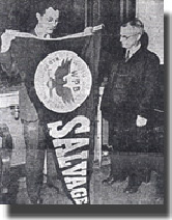You are here
Shortages and Scrap Metal
In this picture, Hoyt Galvin (left), acting chairman of the Mecklenburg County Salvage Committee, receives a victory pennant from James B. Vogler, Executive Secretary of the Conservation Division of the War Production Board in N.C. Mecklenburg was one of 16 counties that contributed 100 or more pounds of scrap per person during September and October, 1942.
America got into the war late. Shortages already felt in other parts of the world became part of life in the United States. The short supply of gasoline, rubber and steel for carsaffected road travel. Hitchhiking became a popular mode of transportation for civilians and military personnel.
The government encouraged civilians to grow “Victory Gardens" on their property to help supply food for their families. By producing food locally, a greater amount could be available for the military. Sugar, meat and many other items were rationed and were obtained by redeeming coupons from ration books or dealing in the black market. Informal trading of needed items brought families and neighbors together.
Luxury items such as silk hosiery were almost impossible to find, much less affordable for the average woman. Japan, one of the world’s leading producers of silk, was one of our enemies in the war.
Rubber could be obtained from friendly countries, but it was needed more for military use in jeeps, trucks and airplanes than for civilian use.
Building materials were also in short supply as were willing homebuyers. Women married to military men often moved in with other relatives or other wives whose husbands were away. The large-scale building of residential housing almost came to a standstill. Wood for crates, barracks, and temporary buildings was more important. Due to the slow growth in housing during the war years, millions of returning veterans were initially unable to buy homes and settle down with their new families.

